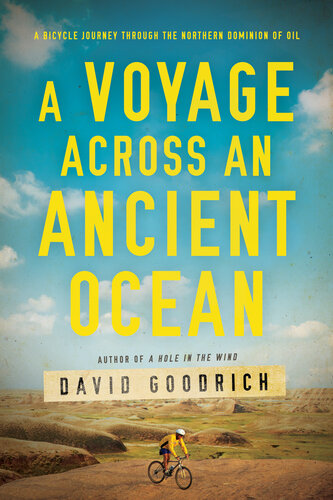
A Voyage Across an Ancient Ocean
A Bicycle Journey Through the Northern Dominion of Oil
- اطلاعات
- نقد و بررسی
- دیدگاه کاربران
نقد و بررسی

May 15, 2020
Goodrich chronicles his bicycle ride from Alberta, Canada, to the northern plains of the U.S., "intent on seeing where carbon comes out of the ground." When he was a young man, the author did some roustabout work on oil rigs off the coast of Louisiana, and then he spent years at the National Oceanic and Atmospheric Administration and as director of the U.N. Global Climate Observing System. Now retired and a long-distance bicyclist hobbyist, he decided to take a 1,100-mile bike trip from the oil sands of Fort McMurray in northern Alberta south to Williston, North Dakota, and the great fracking operation known as Bakken. "I would go on seeking some clues to the nature of this industry," writes the author, "at once so tightly woven into modern life and so threatening to it." Goodrich is an amiable writer. This means that while he is not shy about sharing his firm opinions on the reality and dangers of climate change, he was willing to listen to the personal stories of the oil workers. (He was uninterested, however, in hearing from the industry's public relations flaks). Goodrich spends considerable time exploring the downside of extraction, from the tailing ponds to the brine spills to the many challenges of moving oil through pipelines. He smoothly lays out the histories of the projects and has a keen eye for the politics involved in their stop-and-go construction. He also does a good job explaining the nature of the opposition to the various pipelines--especially two, the Keystone and the Dakota Access--from fears of water contamination to the pollution of the headwaters of the Mississippi River and the harvesting of wild rice to the massive spills that have proven a hallmark of the pipelines. Goodrich concludes with a canny examination of Teddy Roosevelt's trust-busting and the gradual re-creation of those very trusts. A gentlemanly excursion through dirty oil sites that features a caustic, urgent message.
COPYRIGHT(2020) Kirkus Reviews, ALL RIGHTS RESERVED.

June 22, 2020
Scientist Goodrich (A Hole in the Wind) examines oil industry–dependent communities in the U.S. and Canada “where the seeds of climate change are sown” in this sensitive, if less than convincing, attempt to show how opposing voices in the debate over fossil fuels might be reconciled. Embarking on a 1,100-mile bike ride—from Fort McMurray, Alberta, the base of Canadian oil-sands extraction, to Williston, N.Dak., epicenter of the fracking boom—he makes vivid observations of how oil extraction can disfigure the landscape, from vast pools of industrial waste in Alberta that look like “foam in latte,” to brine spills in North Dakota that have contaminated groundwater. But he is less assured when considering how to move along the conversation about climate change. Frequently encountering people involved with the oil industry along his journey, Goodrich strives to overcome their suspicions of his background in climate research, while also pushing back gently against their misconceptions, such as that “climate has always changed.” However, he invariably agrees to let the topic drop so as to not disturb the bonhomie. Goodrich is a sure-footed, amiable guide to the science behind climate change, but brings readers no closer to understanding what it’s going to take to move the conversation about climate change forward.

Starred review from July 1, 2020
In A Hole in the Wind (2017), retired NOAA climate scientist Goodrich chronicled a bike ride he took from Delaware to Oregon to gauge national public sentiment on climate change. Here he hops back on his beloved old Trek with more focused intent, this time following a section of the controversial Keystone Pipeline, from its source in northern Alberta heading south and east across the dry bed of the ancient, inland Western Interior Seaway?which left massive deposits of oil-rich shale in its wake?to Williston, North Dakota, heart of the massive Bakken oil field. Along with a ground-level view of the terrain he crosses? things look different from a bicycle seat, he offers?Goodrich brings science to bear in explaining the region's geological history, its flora and fauna, and the biohazardous and energy-intensive oil-extraction process of fracking, which, he says, can consume as much as one third of the energy it draws out. Goodrich also paints, in finely detailed brushstrokes, the complicated issues surrounding that extraction, from badly needed jobs for thousands of pipeline workers to the serious, long-term risks of lighting the fuse of what climate scientist James Hansen calls the biggest carbon bomb on the planet. The result is a thoughtful, timely, sobering survey.(Reprinted with permission of Booklist, copyright 2020, American Library Association.)




دیدگاه کاربران